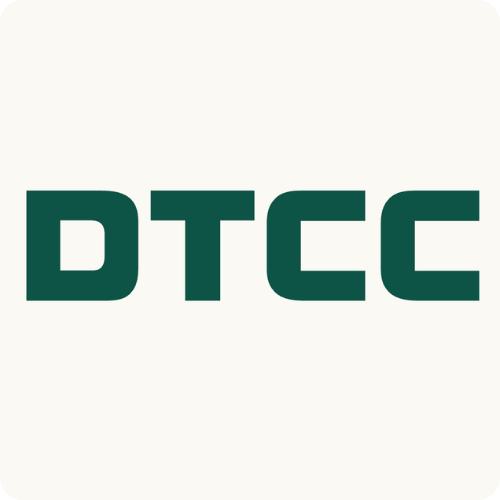
DTCC Digital Assets
The Depository Trust & Clearing Corporation (DTCC) provides post-trade clearing and settlement services that ensure the stability and efficiency of trading activity. As one of the premier financial market infrastructures over the past 50 years, DTCC processes trillions of dollars in securities transactions daily, offering a range of services that automate, centralize, and standardize the processing of financial transactions to mitigate risk and reduce costs.
DTCC’s Digital Assets is a business unit dedicated to bridging the gap between traditional financial infrastructure and the emerging digital asset ecosystem. Its key services include the DTCC Digital Launchpad, an open ecosystem for collaboration on digital asset adoption, DTCC ComposerX, an end-to-end platform for managing the entire lifecycle of digital assets, and the Collateral AppChain, which provides scalable, tokenized collateral management.
As a founding premier member of the Linux Foundation's LF Decentralized Trust alongside Hedera, DTCC is actively involved in shaping the future of open-source, decentralized technologies.
Project Information
Related Projects

Ping Identity is an identity and access management (IAM) solutions firm that was founded in 2002. It offers a comprehensive suite of services that enable secure and seamless digital experiences for employees, customers, and partners.
The core of Ping Identity's offering is the PingOne Cloud Platform, an identity-as-a-service (IDaaS) solution that provides a wide range of capabilities, including single sign-on (SSO), multi-factor authentication (MFA), and API security. A key product within this platform is PingOne for Individuals, which leverages the ShoCard digital wallet to give users control over their own verified personal data.
Ping Identity uses the Hedera blockchain network to provide security and immutable record-keeping.. The PingOne for Individuals solution is built on the Hedera distributed ledger, which is used to ensure that all verified credentials are tamper-proof and that all transactions are securely recorded. By leveraging Hedera's high-throughput and low-cost infrastructure, Ping Identity provides a scalable and reliable platform for managing digital identities.

Lazy Superheroes is a play-to-earn (P2E) idle game built on the Hedera network, centered around a collection of unique superhero non-fungible tokens (NFTs). The project combines digital ownership with passive gameplay, allowing players to earn rewards without requiring constant, active participation. To engage with the game, a player must first own a Lazy Superhero NFT, which serves as their primary in-game character.
The core gameplay loop involves sending superhero NFTs on missions. Missions are time-based and, once initiated, they run passively in the background. Upon successful completion, players are rewarded with $LAZY, the game's native utility token. This token is central to the game’s economy and progression system. Players can then use their earned $LAZY to train their superheroes, which improves their stats and attributes. Upgrading a hero increases its effectiveness, allowing it to undertake more challenging missions and generate greater rewards in the future.
This cycle of sending heroes on missions, earning $LAZY, and reinvesting it into training forms a strategic loop that encourages long-term engagement. The entire ecosystem, from the superhero NFTs to the $LAZY token and the mission transactions, is built and managed on the Hedera network.

Blockchain in Healthcare Today (BHTY) is a peer-reviewed academic journal dedicated to the topic of blockchain and distributed ledger technology (DLT) in the healthcare sector. Published by Partners in Digital Health, BHTY serves as a leading international open-access platform for disseminating research and innovations in this rapidly evolving field. The journal's mission is to foster a global, multi-disciplinary ecosystem by accelerating the sharing of rigorously vetted knowledge on topics such as health information systems, data integrity, supply chain management, and clinical trials.
The journal's primary service is the publication of original research, systematic reviews, and special reports from academics, innovators, and practitioners. BHTY covers a wide range of subjects, including the integration of AI, consent mechanisms, privacy preservation, and new value-based health economic models. In addition to its publishing activities, BHTY produces the annual ConV2X conference, an event that brings together industry leaders to discuss the latest advancements in healthcare platforms and decentralised technology.
A key technological feature of Blockchain in Healthcare Today is its direct integration with the Hedera network. The journal offers an "Article Proof of Origin" service, which creates a permanent and immutable public record of every published research article.

Attestiv is a digital media validation company founded in 2018 to combat the rising threat of deepfakes and AI-generated content. Headquartered in Utah, the company provides solutions for businesses that rely on the authenticity of photos, videos, and documents, with a primary focus on the insurance, cybersecurity, and financial services industries.
The core of Attestiv's offering is its AI-powered platform that analyzes digital media to detect alterations, tampering, and generative AI content. The platform provides a "tamper score" to indicate the likelihood of manipulation and can identify specific anomalies through a forensic scan. This technology is delivered through a suite of products, including APIs and SDKs that can be integrated into existing workflows, as well as a user-friendly dashboard for manual analysis. Attestiv's solutions are designed to automate fraud detection, streamline processes like insurance claims and underwriting, and protect businesses from the reputational and financial risks associated with fake media.
Attestiv uses a distributed ledger to create a "digital fingerprint" that is recorded on the Hedera blockchain network. This allows for the immutable and verifiable timestamping of each asset, ensuring its authenticity can be validated at any point in the future.
